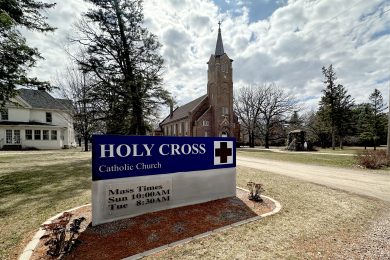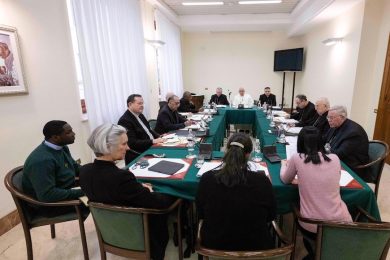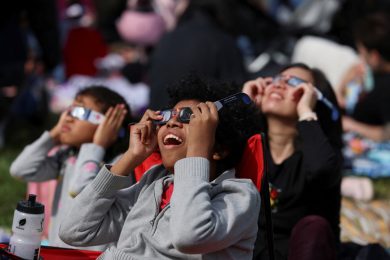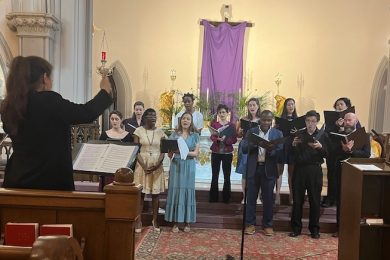By Tom Tracy | Catholic News Service
MIAMI (CNS) — A former U.S. ambassador to the Vatican said unrest in Cuba — something the world has seen before — is translating into a recipe for disaster this year due to added pressures from the COVID-19 pandemic.
There are increasing signs that the newest wave of coronavirus is upending life in poor nations with low vaccination rates and something the world is beginning to witness in Cuba, Haiti and elsewhere.
The result may have unpredictable consequences such as mass migration, according to Miguel H. Díaz, a Cuban-born theologian raised in Florida and selected by President Barack Obama as the United States’ ninth ambassador to the Holy See, serving from 2009 to 2012.
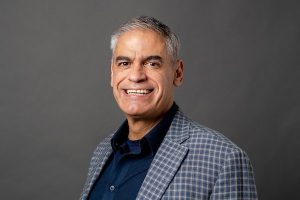
“One of my concerns that has happened before is that internal pressures will cause desperate people to seek desperate measures and take the seas, but the government may also encourage that as a way to relieve pressure — and this has happened before,” Díaz said regarding Cuba in a July 13 phone call.
News reports said the unprecedented protests in Cuba July 11 took place not only in Havana but other Cuban cities. They have been mirrored by ongoing street protests throughout South Florida as recently as July 13.
He added that neither a hurricane season nor shark infested waters may be enough to discourage a large-scale exodus from Cuba or possibly Haiti, with both nations in the throes of a political and economic crises.
“It is always good to be one step ahead and proactively anticipating that that may happen,” Díaz said, adding that in Cuba “in the last few weeks it does appear that cases are rapidly increasing and it tells me one of these variants has taken hold, and that is very concerning.”
He said COVID-19 vaccination programs are a necessary way to deal with the pandemic and that greater international cooperation and distribution is needed for higher vaccination uptake both in poor nations with meager access to vaccines but also in parts of the U.S. where vaccination uptake is lagging.
“The quicker we respond to helping control the virus, the better we are all going to be,” the ambassador told Catholic News Service.
“We all hope for the best in Cuba and in Haiti and other parts of the world especially in respect to the pandemic,” he added. “Clearly the pandemic is just adding to the suffering to people and nations who were already suffering.”
The Centers for Disease Control data show the number of daily new COVID-19 infections has shot up in the United States amid the spread of the highly contagious Delta variant. Deaths from COVID-19 are continuing to decline domestically, but new hospitalizations are reportedly climbing.
Regarding the unrest in Cuba, Díaz, who was born in Havana, said protests of the scale seen the weekend of July 10-11 have not been seen in a generation, “are geographically widespread and involve a cross section of Cuban society, including members of various ethnic and racial communities, practicing and non-practicing Catholics, and members of other religious communities.”
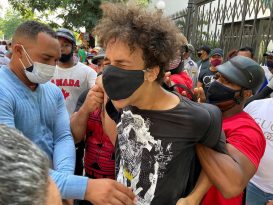
Pope Francis, he said, can use this moment to call upon the Cuban government to end its human indifference toward its people, respect their fundamental human rights and dignity, and heed their cry for liberation and democracy.
“He can also call upon the United States and world leaders to come together to enact foreign policies that will advance, in the words of Pope Francis, ‘justice, peace, liberty and reconciliation’ within Cuban society,'” he said.
“When the pope speaks, the world listens. Full stop. Pope Francis is well known as an advocate of the poor, the vulnerable and the oppressed.”
Díaz said he believes the reports of a coronavirus surge in Cuba are likely real, if not underestimated, and based in part on information collected by the University of Oxford-affiliated Our World in Data reports.
The agency’s website shows a sharp, recent increase in the rolling seven-day average of confirmed cases of coronavirus in Cuba.
Cuba also reportedly announced its two-shot Soberana 2 vaccine, delivered with a booster called Soberana Plus, had proven 91.2% effective in late stage clinical trials against the coronavirus, following similar news about its Abdala vaccine. But Cuban efficacy claims have not been peer reviewed in the scientific community, according to Reuters news agency.
“As Cubans face an ongoing social virus due to political repression and an unprecedented biological virus,” Díaz said, “we must not only pray as Catholics for the well-being of our southern neighbors, but we must also commit human resources to support our neighbors to the south as the people of Cuba address this twofold humanitarian crisis.”
He added that Cuba’s devotion to Our Lady of Charity has a long history of being a source of comfort to communities there facing life-threatening situations.
“La Caridad del Cobre is a symbol of God’s love on behalf of the vulnerable. Since the beginning of her devotion among marginalized Afro-Cuban slaves and indigenous populations, she has also been associated with healing physical and social bodies,” he said.
Díaz currently holds the John Courtney Murray University Chair in Public Service at the theology department of Loyola University Chicago. He has a bachelor’s degree from Miami’s St. Thomas University and master’s and doctoral degrees in systematic theology from the University of Notre Dame.
From 2001 to 2003, he taught and served as academic dean at St. Vincent de Paul Regional Seminary in Boynton Beach, Florida. He also is a board member of the Catholic Theological Society of America and past president of the Academy of Catholic Hispanic Theologians of the United States.



